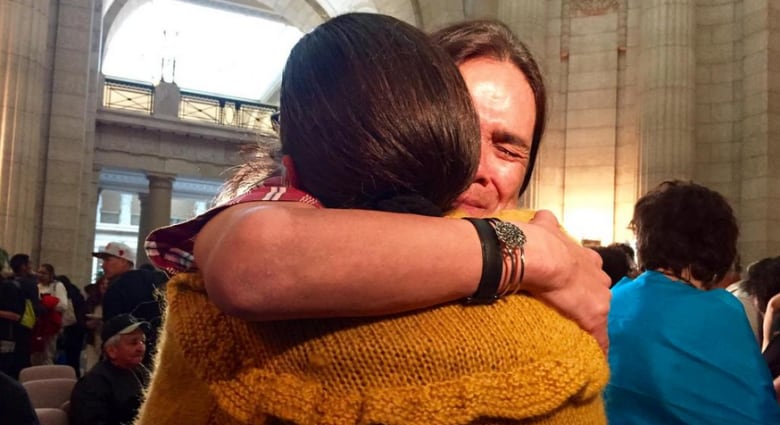Sixties Scoop adoptees gather at University of Winnipeg to share, heal
Delegates at 3-day conference will also discuss how to plan a path forward
Aboriginal adoptees forced from their families by the Canadian government in the Sixties Scoopare meetingin Winnipeg this weekend to share their experiences and look at ways to heal.
The gathering, dubbed Connecting Our Spirits, bringstogether a number of survivors to work through the loss and reflect on their experiences. The event began Friday at the University of Winnipegand runs until Sunday.
Between the 1960s and 1980s, an estimated 20,000 indigenous children were taken from their parents by child-welfare workers and placed with mostly white families across Canada and the United States.As a result, many lost touch with their culture and traditional language.
- Greg Selinger, Manitoba premier, apologizes for Sixties Scoop
- Sixties Scoop victims demand apology, compensation
Duane Morrisseau-Beck, who was taken from his Mtis home when he was a young boy, says he wants to establish an organization to help adoptees as well as educate governments and the public about the issue.
Morrisseau-Beck said there are many people who are "lost" as a result of the Sixties Scoop.
"Adoptees felt very isolated, many of them have never come home. Some of them have come home; they're isolated even if they do reconnect with their families," he said.
I'm covering #60sScoop conference at U of #Winnipeg today. Adoptees are looking for healing. #cbcmb @CBC_Aboriginal pic.twitter.com/5CJ3iHshRk
—@karenpaulscbcSocial worker Beverley Jones says she was taken from her family when she was just two months old. She was placed in a foster home in Souris, Man., for five years before she was returned to her birth parents.
Jones said she ended up being moved back and forth between her foster family and her home reserve, not knowing where she truly belonged.
She said she experienced sexual abuse and started drinking and using drugs at a young age, but she turned her life around.
"One of the things I always say is in order to heal, one must first know they have been violated. If that is understood, the healing process can begin," she said.
"How many out there don't even know they've been violated? It's genocide. It's genocide and that's all it is."
'I was not alone anymore'
Jones recalled going to a similar conference of Sixties Scoop adoptees in Edmonton and feeling like she belonged.
"I felt so, so wonderful. I was not alone anymore. That is what I believe this will bring," she said.
"It's going to bring people to connect, reconnect with each other, but most importantly, with themselves."
Jones said she believes there should be compensation for survivors of the Sixties Scoop.

"[It's] to come together collectively as a voice, as Manitoba's voice to see what we want to do,"said Kern,who was also taken from her home during the Sixties Scoop.
"Do we want to look at class-action suits? Do we want to look at an apology?"
Manitoba Premier Greg Selinger issued a formal apology for the Sixties Scoop earlier this year.
"The fact that acknowledgement of what harm has been done is important, and that needs to be done by all provincial jurisdictions.Manitoba issued an apology a while ago, and that's an important first step," said Manitoba Justice Murray Sinclair, who headed up the national Truth and Reconciliation Commission on residential schools.
Kern said in Australia, there is a National Sorry Day that acknowledges a period of 60 years in the country's history where indigenous children were forcibly removed from their homes and placed in white foster families or institutions.
She said National SorryDay is an example of something the province can learn from.
"[We can] see what it is and what they had to do or steps they took to get that National Sorry Day. That way we can hear first-hand exactly what they did and is this something that Manitoba wants to or all of Canada is going to do eventually," she said.













_(720p).jpg)


 OFFICIAL HD MUSIC VIDEO.jpg)
.jpg)



























































































